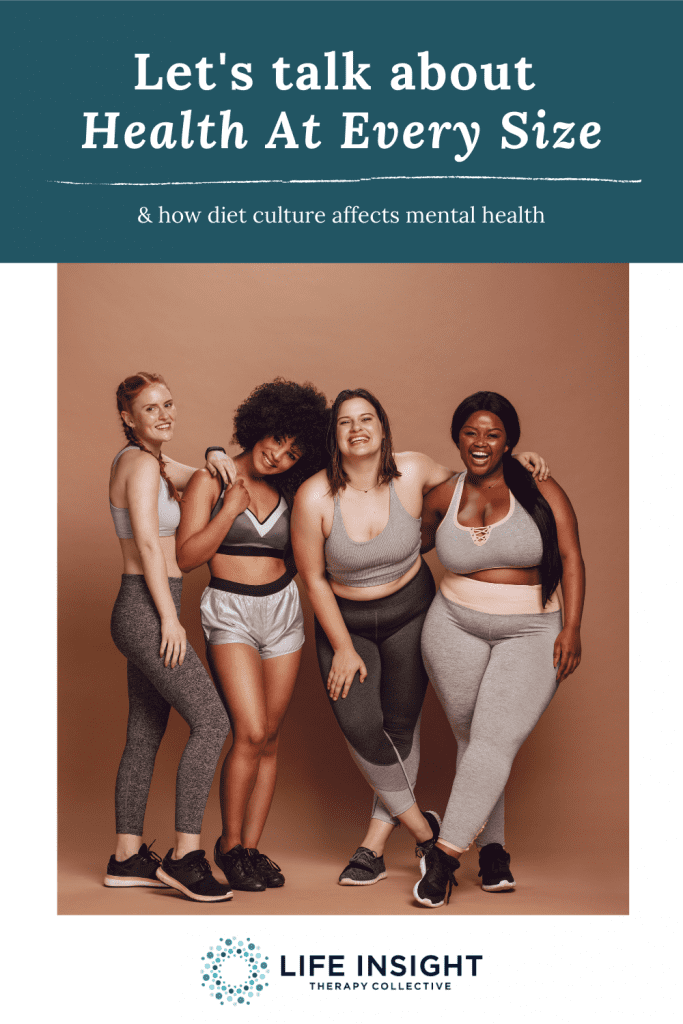Health At Every Size
Health At Every Size is a movement that fights against diet culture and the idea that there is an “ideal body” type we should all strive for. (More on diet culture in a minute…) Health At Every Size (HAES) recognizes that size, race, national origin, sexuality, gender, disability status, and other attributes, are actually assets and that none of these features indicate our “health” status. HAES supports the idea that fatness or thinness and high or low BMI don’t actually indicate the lifespan of a person, whether or not they will develop medical conditions, or if they are good and acceptable people in our world.
In other words, all bodies are good bodies.
“It should be obvious, but weight stigma does not reduce “obesity”—and health care should be about self-care and promoting the health of the person in all its forms.”
– Lindo Bacon, Ph.D.
Also known as the new peace movement, HAES aims to encourage love and acceptance of self as well as the wide range of bodies in the world. It helps us to understand and respond to our body’s natural signs of hunger and fullness, and focus on a healthy lifestyle as the way to ensure a healthy body.
According to the HAES Manifesto, the four principles of this movement are:
- Accept your size.
Learning to love and accept the body you live in is the key to living with the Health At Every Size mindset. - Trust yourself.
Your body is designed to tell you what it needs to maintain its appropriate healthy weight. Learn to hear and respond to signs of hunger, fullness, and appetite. - Adopt healthy lifestyle habits.
Developing meaningful connections with others and finding purpose in life brings fulfillment socially, emotionally, and spiritually. This balance brings food back into a place in your life where it brings nourishment and pleasure. Find joy in movement, enjoy foods that taste good, and embrace that all food is good food in the context of an overall healthy lifestyle. - Embrace size diversity.
Find yourself open to all of the different body shapes and sizes in the world and fight against the idea that some bodies are better than others.
So, you may be wondering, “what is diet culture and why is it so bad?” According to Christy Harrison, an Anti-Diet Registered Dietitian, Certified Intuitive Eating Counselor, and Journalist, diet culture refers to the system of beliefs that:
- Worships thinness as a health & moral virtue
- Promotes weight loss as a means of attaining status
- Demonizes certain ways of eating and elevating others invoking shame in eating and food choices
- Oppresses people who don’t match up to the picture of “health”, harming people of all genders, bodies, races, and ability – thus often damaging mental & physical health
Participating in diet culture doesn’t always look like being on a diet. “Clean eating”, cleanses, carb restriction, and tons of other seemingly harmless “Wellness Diets” all fall under diet culture because they involve the moralization of food. If you grew up in a Western culture mindset, the chances are good that you participate in the mindset of diet culture without even realizing it. Casually “watching what I eat” to go down a pant size or commenting on eating a treat at a birthday party as a “cheat” is participating in diet culture, and is more harmful to the mental health of yourself and others than it might seem.
Diet culture contributes to disordered eating in many ways. Often, due to weight stigma, higher weight people are prescribed disordered eating habits by physicians rather than science-based interventions that would be prescribed for a smaller sized body. This is harmful to people of all body sizes because it normalizes and encourages disordered eating as doctor-approved. Pairing that with the fear of becoming larger leads non-fat people with eating disorders to cling to disordered eating as a “healthy practice”.
“If we truly want to prevent eating disorders and create a culture where full recovery is possible, we need to learn to identify Diet Culture and speak out against it.”
-Ragen Chastain, NEDA Ambassador
Here is an article from the National Eating Disorders Association that is helpful in identifying and resisting the diet culture mindset. As mentioned in this article, it can be good to seek the guidance of a HAES-based dietitian if you are struggling with an eating disorder, or need additional support around reframing your relationship with food and body acceptance.
Join Our Community.
Sign up for our quarterly newsletter with practice news, timely resources, staff highlights, and other helpful tidbits!
Recent Posts







